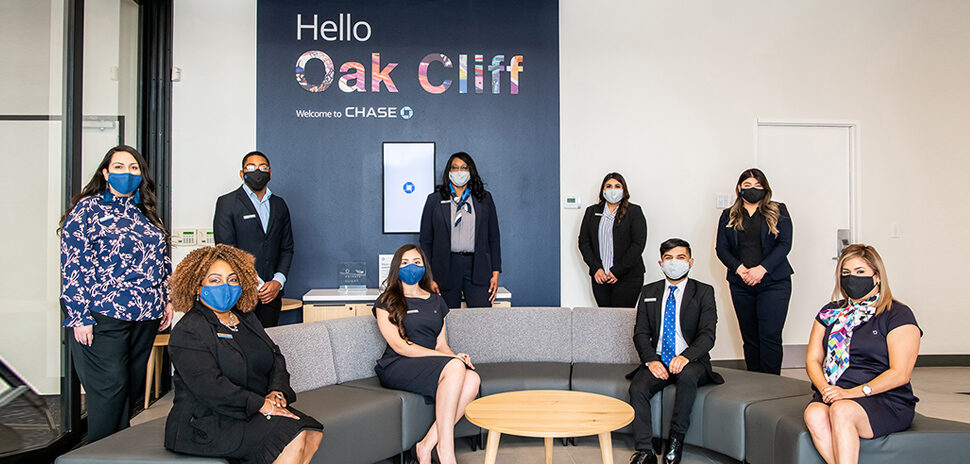![]() In this weekly column, CEO of The DEC Network, Bill Chinn, interviews a “celebrity mentor” that is currently participating in the organization’s Fast Start Mentoring Program. The program matches tenured business leaders who have handled crises before to small business owners struggling to navigate the COVID-19 crisis.
In this weekly column, CEO of The DEC Network, Bill Chinn, interviews a “celebrity mentor” that is currently participating in the organization’s Fast Start Mentoring Program. The program matches tenured business leaders who have handled crises before to small business owners struggling to navigate the COVID-19 crisis.
This week, Bill Chinn spoke with Colleyville-based Michael Dzura, COO and senior operations executive at Mattress Firm, to get actionable advice for small business owners and entrepreneurs including taking care of both your associates and your customers, creating a zone of total trust with your mentor and staying strong and aggressive through this pandemic.
Bill Chinn: Why do you mentor and why do you think mentoring is so important?
Michael Dzura: Mentoring is very important both in my practical business career as well as life. It is an opportunity to give back and it is an opportunity for me to share a lot of the experience that I’ve had over three industries and a multitude of Fortune 500 companies, to share with some folks that have not reached that experience level yet and to give them some perspective on it. It’s very important that we help a lot of people who have the opportunity to grow successfully, whether they are entrepreneurs or within a major organization. That’s why I mentor, to help entrepreneurs grow and develop.
Chinn: That’s great, Mike. In this kind of crisis management mode we are in today, why is experience so significant in a time like this?
Dzura: I’ve been able to guide a lot of folks in the last five years and I’ll see something come up in a business that I have seen before often, but I have to tell you, none of us have seen this one before and this is new. This pandemic is a crisis, and there is a lot of experience you can draw from how you handle a crisis. I see organizations doing this the right way, and I see organizations that are not doing this the right way. Not only can we share a perspective of what it’s like to be in a major crisis, but we can also guide folks into the new normal that is about to break out or is breaking out presently. It is really important to take care of our people and our guests—this is going to become even more paramount in the next five years and beyond.
Chinn: You mentioned some organizations are managing this crisis really well and some organizations are not. Can you give an example of a company out there that is handling this crisis well?
Dzura: There are several, but one that comes to mind is Raising Cane’s. They are doing a phenomenal job with how they are dealing with the crisis, their associates and their customers. If you watch Todd Graves, the founder, on his commercial, the first thing he talks about is safety and sanitation before he gets to the food or brand or anything else. It becomes absolutely paramount that this is about the safety of his people and the safety of his customers first, and then he mentions something about the best chicken fingers in the world. I predict there will be some pretty large management changes too—a lot of people are not able to manage this way. They give servant leadership a talking piece, but they don’t practice it in their management. The organizations that are doing that right now are the ones that are going to be way ahead of the game, both in taking care of their people and their customers, which will ultimately take care of their sales and profits.
Chinn: You’re absolutely right, this pandemic is really showcasing the businesses that are doing really well through all of this.
Dzura: Yes, and we have to think about how we treat each other, how we treat our associates and the people that work with us, how we treat customers, and how we treat each other as human beings. If nothing else, this pandemic has certainly highlighted the organizations that are practicing the behavior of what true servant leadership is all about. Those businesses are going to be the ones that win the sales and profit game as well.
Chinn: As you have mentioned the “new normal” a few times already, can you describe what you think the new business normal will look like?
Dzura: First and foremost, in order to protect and take care of people in this as we reopen, businesses need the ability to be sanitary and the ability to allow people to believe that whatever shopping environment they may be in is safe. How are you going to assure customers that your business is safe and secure? Restaurants have a leg up on this because they have been practicing food safety and sanitation for a long time. It is a business killer if they don’t, but the question is, how are retailers able to do that and have people feel very, very safe?
I was in Central Market not too long ago and they are doing a phenomenal job at setting the example of safety for people before they sell anything to you. They broke their stores down and changed their layout a little bit, and they only let so many people in the store at a time. With the new normal, that’s where you have to go first to assure customers. If you do this well, you are going to win that repeated business.
Chinn: Do you have any specific recommendations for businesses who are struggling through COVID-19?
Dzura: In the spirit of the kind of society and world we live in, at least in this country, it’s always been a country that’s had an opportunity to be great. In a crisis, when you’re not sure if you are going to make the payment on the rent next month or be able to pay your associates or whatever the challenge in the new normal is, entrepreneurs need to start rethinking their businesses a little bit. They don’t necessarily need to change it dramatically, but at least rethinking it and potentially reinventing it is a good first step. Small business owners make up over 50% of the businesses in this country, and they can be very inventive and very aggressive in their survival instincts. Business owners are going to call upon that more and more these days. It’s easy to get down at this time and it’s easy to throw your hands up and say, “well, it’s the result of this virus and I can’t do it,” but we have to figure out how to do it. My advice is to stay tough, stay aggressive and take some risks now that you might not have thought about taking before when things were going pretty well.
Chinn: Back to mentoring, can you talk about a mentoring relationship you’ve had that was critically productive?
Dzura: I’ve had quite a few over my career, but recently I had an individual that wanted to get to a certain level of the organization. A lot of people set their sights on their goals, but aren’t really ready for that jump. Had they made that jump at that particular moment in time, they would have probably failed, quite frankly. I started talking with this individual about how we could grow them, develop them and get them ready for that level. I said, what are the things that you see and that I see that we can work on together, and that we can challenge you with so that you grow into this role? Many times the toughest role change is going from a single unit operator to a district manager role or that next level supervisor role where you have a span of control now, whereas you’re not in that storeroom every day anymore and you can’t micromanage it anymore. That particular growth pattern is really critical and really necessary for mentorship.
Chinn: That’s very interesting and you make a great point that mentorship can really avoid some of the problems of moving too fast in business. Can you talk about a time when you were the mentee and you got some really great business advice?
Dzura: I’ve had several phenomenal mentors and I can give you an example of some of the best advice that I got in my career. I was in the restaurant business at Young Brands and, specifically, Taco Bell. There was a fantastic leader there and the best boss I ever worked for. I had this powerhouse region at the time—we were number one in everything and we were winning everything, and just really great people. We took on an under-performer that came into our region and she was immediately cast out because she wasn’t performing like the rest of our group. My boss pulled me aside when we were visiting her one day and she said, “Let me ask you a question. What are you here for? Are you here to be number one, or are you here to run the best restaurants?” I told her I was here to run the best restaurants, and her recommendation was, instead of eliminating this person, I work with her and see if I can make her successful. That stuck with me forever and I’ll ask people regularly now why they are doing what they are doing, and what broader purpose they have. It’s a really captivating question.
Chinn: Thanks for that great example, Mike. Let me ask you about one-on-one mentoring. Where does the power come from when mentoring one-on-one, and why not just put it in a pamphlet or a book?
Dzura: One-on-one mentoring is impactful because there is a zone of total trust there and there is a zone of relationship building. You can form a bond and a relationship that, hopefully, lasts well beyond the official mentor/mentee assignment that we are on. It’s also educational for both parties—I’m probably learning as much as my mentee. There are particular problems that different businesses are going to have that can only be discussed in a one-on-one format versus broadly in a classroom, on a Zoom call or something similar where you have six or seven people. A lot of mentees might be afraid to speak up about what the problem is or where they are with their businesses or what they are struggling with for fear of either looking like they are failing or looking like they don’t have a grasp on things. At the same time, it’s good to get a round table going down the road as well, but one-on-one is critical right now as small businesses are in survival mode.
Chinn: That’s true, trust is very important with one-on-one mentoring. What books are you reading right now?
Dzura: You learn a lot from history, so the three books I’ve read most recently are In Harm’s Way by Doug Stanton about the sinking of the U.S.S. Indianapolis, which is really a stunning book. I just picked up Thomas Jefferson: The Art of Power by Jon Meacham and am going to read about Jefferson and Hamilton—they were both going through that generation at the same time kind of on opposite sides so that’s interesting. I also just finished the first book in the Revolution Trilogy by Rick Atkinson. All of those books are phenomenal.
Chinn: I love that you are a history buff. What are you watching while being stuck inside? Are you a Tiger King fan?
Dzura: I am a Tiger King fan and I told my wife we would drive up to Wynnewood to look at the compounds. We’re watching a lot of stuff now, as I think everyone is. Out of all the sports, basketball is probably the one I’m least into and least engaged with, but I thought the Michael Jordan documentary was phenomenal. There’s also a really cool documentary called Skid Row Marathon—it’s about a judge in LA who literally goes into the homeless shelter and starts training people there to run marathons and then he finds a way to get them across the world. I’m also taping the three-part series on Ulysses S. Grant that’s on the History Channel right now, which I’m really looking forward to.
Chinn: Those are great suggestions. What restaurants in North Texas are you supporting right now?
Dzura: I’ve already mentioned them, but we probably get our Raising Cane’s fix about once a week. We have to do a Mexican food fix too and we’re big fans of Rio Mambo for that. For burgers, we go to Freddy’s. These are the businesses that have struck me as being very conscious and we like them.
Chinn: When we get the green light to do whatever we want to do, what are you going to go do?
Dzura: That’s easy—my oldest daughter lives in New York City, in Brooklyn actually. She had her first child, our first grandchild, back in late August and we got to visit her four times until February, but we’ve been shut down ever since. So the first thing we’re going to do is head to New York and visit our granddaughter, no question about that.
The DEC Network is a partner of Dallas Innovates. The 501c3 non-profit organization drives innovation and economic impact by helping entrepreneurs start, build, and grow their businesses. Through a number of innovation hubs across DFW, The DEC Network provides entrepreneurs with education, mentorship, community, and advocacy. For more information, please visit www.thedec.co.
![]()
Get on the list.
Dallas Innovates, every day.
Sign up to keep your eye on what’s new and next in Dallas-Fort Worth, every day.


































































